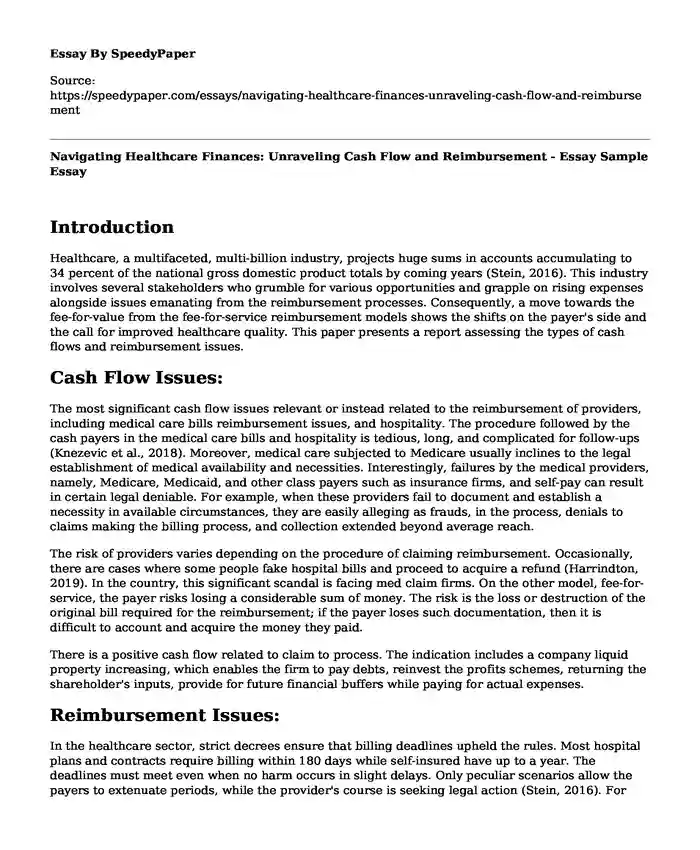
| Type of paper: | Essay |
| Categories: | Health and Social Care Finance Medicine Healthcare |
| Pages: | 3 |
| Wordcount: | 679 words |
Introduction
Healthcare, a multifaceted, multi-billion industry, projects huge sums in accounts accumulating to 34 percent of the national gross domestic product totals by coming years (Stein, 2016). This industry involves several stakeholders who grumble for various opportunities and grapple on rising expenses alongside issues emanating from the reimbursement processes. Consequently, a move towards the fee-for-value from the fee-for-service reimbursement models shows the shifts on the payer's side and the call for improved healthcare quality. This paper presents a report assessing the types of cash flows and reimbursement issues.
Cash Flow Issues:
The most significant cash flow issues relevant or instead related to the reimbursement of providers, including medical care bills reimbursement issues, and hospitality. The procedure followed by the cash payers in the medical care bills and hospitality is tedious, long, and complicated for follow-ups (Knezevic et al., 2018). Moreover, medical care subjected to Medicare usually inclines to the legal establishment of medical availability and necessities. Interestingly, failures by the medical providers, namely, Medicare, Medicaid, and other class payers such as insurance firms, and self-pay can result in certain legal deniable. For example, when these providers fail to document and establish a necessity in available circumstances, they are easily alleging as frauds, in the process, denials to claims making the billing process, and collection extended beyond average reach.
The risk of providers varies depending on the procedure of claiming reimbursement. Occasionally, there are cases where some people fake hospital bills and proceed to acquire a refund (Harrindton, 2019). In the country, this significant scandal is facing med claim firms. On the other model, fee-for-service, the payer risks losing a considerable sum of money. The risk is the loss or destruction of the original bill required for the reimbursement; if the payer loses such documentation, then it is difficult to account and acquire the money they paid.
There is a positive cash flow related to claim to process. The indication includes a company liquid property increasing, which enables the firm to pay debts, reinvest the profits schemes, returning the shareholder's inputs, provide for future financial buffers while paying for actual expenses.
Reimbursement Issues:
In the healthcare sector, strict decrees ensure that billing deadlines upheld the rules. Most hospital plans and contracts require billing within 180 days while self-insured have up to a year. The deadlines must meet even when no harm occurs in slight delays. Only peculiar scenarios allow the payers to extenuate periods, while the provider's course is seeking legal action (Stein, 2016). For example, a patient arriving at the hospital, the staff acknowledges the medical payer, Amerigroup; however, due to circumstances, make it last resort to contact the payer. Verification of the I.D. the patient presents shows an excellent medical cover, but the obvious argument is the delay in providing the billing requirements to the payer.
Recoupment means the expenses are recovered. The reduction may withdraw for legal reasons. An example when documents are missing, and the provider denies the partial claim (Knezevic et al., 2018). If it is said after submitting the missing forms, they are entailed to the remaining amount in the ownership. The payer also offers the missing records to recover his expenses.
Health economics entails issues relating to efficiency, valuation, and behavior in the process of healthcare and health consummation. In economics, this branch study's actions were smoking. In summary, these behaviors like smoking, alcohol intake amount to reasons for difficult health economics towards healthcare providers.
Conclusion
The Healthcare industry amounts to the deals in health benefits and technical expertise required in delivering such services. The cash flow and refund issues show pitfall and uncertainties in billing and collection trends. The idea is medical agencies overpay and underpay the providers depending on the problem inflows.
References
Stein, R. (2016). A Simple Hedge for Longevity Risk and Reimbursement Risk Using Research-Backed Obligations. https://papers.ssrn.com/sol3/papers.cfm?abstract_id=2736993
Knezevic, S., Mitrovic, A., & Sretic, D. (2018). Specifics of reporting on cash flows in insurance companies. Hotel and Tourism Management, 6(2), 21-33. https://www.ceeol.com/search/article-detail?id=725955
Harrington, K. (2019). Health Care Finance and the Mechanics of Insurance and Reimbursement. Jones & Bartlett Learning. https://books.google.com/books?hl=en&lr=&id=j1auDwAAQBAJ&oi=fnd&pg=PP1&dq=Cash+Flows+%26+Reimbursement+&ots=nNxi5DCLDo&sig=21f3XcA5Nehn20PFcd9zmtv8wps
Cite this page
Navigating Healthcare Finances: Unraveling Cash Flow and Reimbursement - Essay Sample. (2023, Dec 14). Retrieved from https://speedypaper.com/essays/navigating-healthcare-finances-unraveling-cash-flow-and-reimbursement
Request Removal
If you are the original author of this essay and no longer wish to have it published on the SpeedyPaper website, please click below to request its removal:
- Debt Collectors Research Paper Example for Your Free Use
- Free Essay Sample: Action Plan Proposal for Oncology Facility
- Lending Institutions, Health Care, and Human Capital: Kenya, Economics Essay Example
- Healthcare in America Essay Sample
- Paper Example on Supporting the Use of Cash Flow Sensitivity
- Essay Example. Unethical Behavior in Business
- Impacts of Covid-19 on America's Universities - Free Paper Sample
Popular categories




